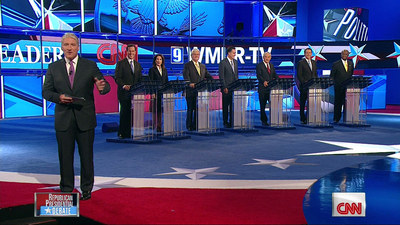
Candidates advocate deregulation for economic growth.
On Monday night, as seven Republican presidential candidates gathered in New Hampshire for a primary debate, the common enemy at the event seemed to be regulation.
Most candidates supported deregulation as a means of achieving greater economic growth, arguing that regulation under the Obama administration has stifled job creation. As former Pennsylvania Senator Rick Santorum described the need for “an economy that’s unshackled” from “oppressive regulation,” former Minnesota governor Tim Pawlenty emphasized a desire to “fix” regulation and the regulatory process.
Some candidates stated that the federal agencies they perceive as preventing job growth should disappear. Representative Michele Bachmann (R-MN) implied she favored dismantling the Environmental Protection Agency, describing it as the “job-killing organization of America.” Similarly, former Speaker of the House Newt Gingrich urged Congress to immediately defund the National Labor Relations Board to prevent what he termed a “threat from the Obama administration to eliminate the right to work.”
Frequently, candidates identified repealing regulatory legislation as a way to improve economic growth. Both Gingrich and Bachmann advocated the repeal of the Dodd-Frank Act. Representative Ron Paul (R-TX) blamed the Federal Reserve, and what he termed its “deliberate job” to “weaken the currency,” for the loss of domestic manufacturing jobs. Without the Federal Reserve, Paul argued, the U.S. could achieve growth on par with Brazil or China.
Former Massachusetts Governor Mitt Romney and Bachmann both promised the repeal of the Obama administration’s health care laws, with Romney adding that he would grant a waiver to all states on his first day in office.
The candidates maintained an anti-regulatory stance when discussing the Troubled Asset Relief Program (TARP) passed under the Bush administration. For example, Herman Cain noted that although he initially supported TARP, he did not agree with either its use by non-financial institutions or what he termed the administration’s “discretionary” process of “picking winners and losers.”
Despite the event’s obvious focus on the presidential election, Gingrich noted that the upcoming election season “cannot be only about the presidency.” He asserted that repealing major regulatory legislation would require substantial Republican gains in Congress as well as a Republican capture of the White House.
The photograph above belongs to David S. Holloway of CNN.



